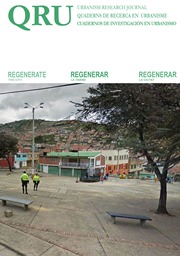Regeneración urbano habitacional como herramienta para abordar la desigualdad territorial
DOI:
https://doi.org/10.5821/qru.9628Abstract
This document gives an account of the lines of interest developed by the researcher as a result of a professional career on urban-residential regeneration programs in the Ministry of Housing and Urban Development MINVU of Chile (since 2007), and its parallel performance as a member of the Institute of Housing (INVI) of the Faculty of Architecture and Urbanism (FAU) of the University of Chile since 2009. First, in order to give an account of the topics developed, and also to contextualise, the ministerial institution and the Chilean urban housing reality are described problems are exposed and alsohow, from various regeneration programs, they haves been approached at the level of public policies. Second, the diverse works, activities, researches and methodologies developed by the scholar as a member of the Institute of Housing are presented, exposing the topics that are currently the object of my interest, as well as some research progress.Downloads
Issue
Section
License
Those authors who have publications with this journal, accept the following terms:
a. Authors will retain their copyright and guarantee the journal the right of first publication of their work, which will be simultaneously subject to the Creative Commons CC BY-NC-ND-4.0 recognition license that allows third parties to share the work provided that its author and its first publication are indicated in this journal, but they cannot be changed or used commercially.
b. Authors may adopt other non-exclusive license agreements for the distribution of the version of the published work (eg: deposit it in an institutional telematic archive or publish it in a monographic volume) provided that the initial publication in this journal is indicated.
c. Authors are allowed and recommended to disseminate their work through the Internet (e.g. in institutional telematic files or on their website) before and during the submission process, which can lead to interesting exchanges and increase citations. of the published work. (See The effect of open access).













